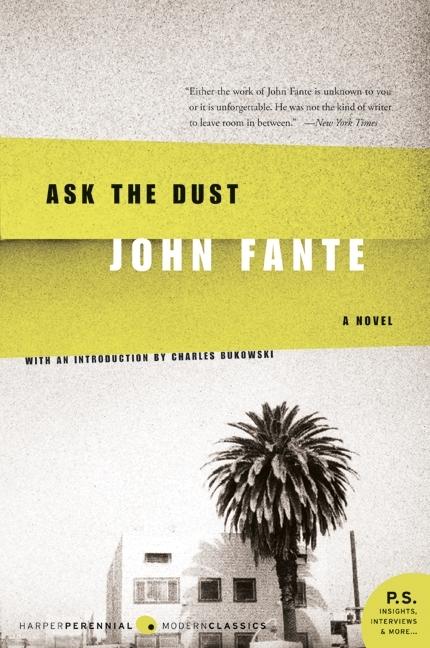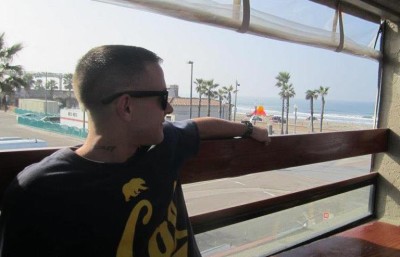“Ask the Dust” is a novel by American writer John Fante, originally published in 1939. Set in Los Angeles, it is a story of desperation, unrequited love, success, failure and insanity. The protagonist, Arturo Bandini, is a struggling writer, living off oranges and stolen milk to avoid starvation. It is a semi-autobiographical work of fiction, much of it coming from Fante’s own experiences as a struggling writer in the early stages of his career.
The story begins with Bandini nearly being evicted from a pay-by-the-week hotel in the Bunker Hill area of Los Angeles, and only avoids this by lying to his landlady about having sold a short story to a magazine. Bandini is an outsider; one of the book’s central themes is him trying to find acceptance of some kind, whether it’s becoming a successful writer or having enough money to interest the beautiful women that Fante so vividly describes. Bandini feels that his work being published is the key to him finding acceptance and happiness, and without that happening, he will never be validated. He feels that he could be one of the all-time great American writers and is frustrated that it hasn’t happened yet.
Bandini fends off starvation and affords his rent by selling a short story called “The Little Dog Laughed” to a magazine. Given several copies by the publisher, he strategically places them around the hotel that he stays in, hoping that his neighbors will notice them. Much to his disappointment, his neighbors show no interest, save for a 14 year-old girl, Judy, who reads his story and idolizes him.
Being poor is a constant problem for Bandini. He spends his money foolishly and becomes destitute several times. Then he seems to miraculously sell another story for publication, and upon receiving payment, promptly spends all his money quickly on frivolous items.
Camilla, a young Mexican-American waitress, is introduced early on in the story. Beautiful and graceful, she represents all of the women in Los Angeles that Bandini sees and desires, and he is sure that when he becomes a successful and established writer, she will be impressed and fall in love with him. Another constant in the novel is the erratic manner in which Camilla and Bandini treat each other: tender and passionate one moment, horrible and degrading the next. Camilla and Bandini insult each other throughout the book, and racial discrimination is present throughout the story.
Eventually, Bandini starts to have more success in getting published, but even with his newfound notoriety, Camilla remains distant. This is symbolic for success; Bandini realizes that being published is only a monetary reprieve, and brings him no closer to Camilla, and is not the key to happiness. Camilla also realizes that she can’t have the man she loves, and it ultimately drives her insane.
Bandini finally realizes that he can never have Camilla, and Camilla realizes that she can never have who she wants. As a struggling young writer, John Fante equated being rejected by publishers and being rejected by women as the same thing. It’s obvious in his writing that he felt that the best writers were usually ignored, both by women and publishers.
“Ask the Dust” is a masterpiece, written by a tragically unappreciated American novelist. The writing, while sometimes lofty, allows readers into the mind, heart and soul of Arturo Bandini. Readers will celebrate his happiness, feel the depths of his despair and curse his stupidity. Los Angeles is depicted as a dirty and grimy place in the novel, and Fante makes his readers hear every horn honk, smell the pollution and feel every emotion that Bandini himself feels. The city itself is an ever-present character in the story. In turns depressing, inspiring, humorous, mocking and sentimental, the pages of “Ask the Dust” seemingly flip themselves.
Not everyone who reads this book will love it, but there is an undeniable truth and sophistication to it that many books are lacking. “Ask the Dust” is highly recommended.


